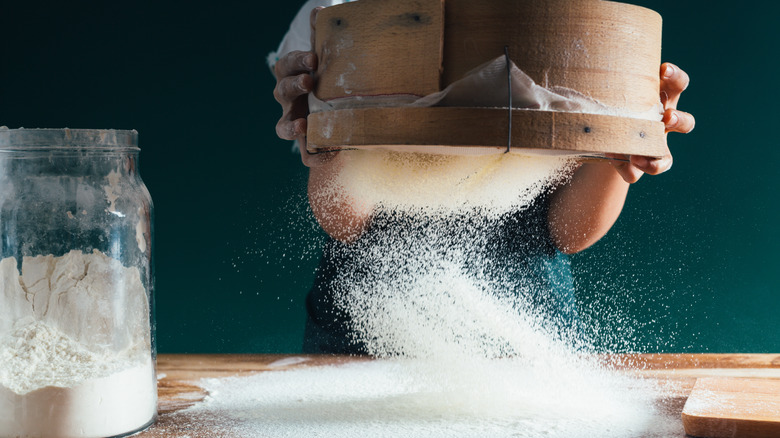The Cake Prep Step Duff Goldman Thought Was A Myth
Even professional chefs learn new tricks. Such is the case with master baker Duff Goldman, who now has the wisdom and experience to look back and evaluate his culinary journey with a more appreciative lens. "Oh golly, I have pages and books and volumes of tips I wish I could go back and tell my young pastry chef self," Goldman told Allrecipes. One of these tips includes a game-changing move that he learned from his "Baking Championship" co-judge Nancy Fuller — sifting.
While sifting dry ingredients may seem like an instruction relegated to old cookbooks, the simple action can make a big difference in the texture and taste of baked treats, insists Goldman. Goldman admits that he, too, didn't believe shaking dry ingredients could drastically impact a recipe until he tried it out for himself. After skeptically going through the motions, Goldman was shocked to discover that sifting flour does, in fact, help aerate grains and prepare them for a better bake. "It just makes it so much lighter and spongier and softer," Goldman explained to Insider.
An easy step for a nicer finish
When describing his reluctance to sift baking ingredients, Goldman admitted to Allrecipes, "I was like 'This feels like lore. This feels like something leftover from a bygone era when flour was clumpier. This is an extra step and I'm not doing it because I've got things to do.'" Yet taking the extra time to sift dry ingredients can save your cake — or at least help increase the probability that your dessert will turn into a baked success.
When sifted ingredients are fluffed, dry components can be better mixed into cake batter, and less movement in the mixer will result in a finish that is airy and light instead of chewy and dense. Sifting separates grain particles to a finer degree, ultimately resulting in more uniform mixtures of ingredients. Then when wet and dry ingredients are combined in a mixer, the less likely gluten will develop in your mixing bowl, and your cake is at a lesser risk of taking on a more textured, dense mouthfeel.
"I just think of how many cakes I've made in my life and how many of them could have been better if I just sifted my flour," Goldman lamented. Take his advice and sift the dry ingredients for your next cake. You'll be rewarded with a fluffier, lighter slice to sink your teeth into and serve.

